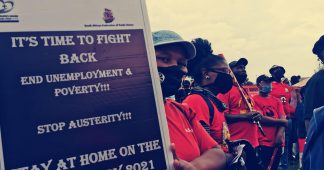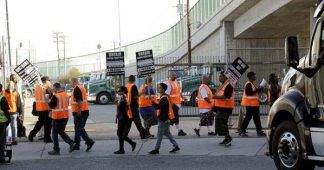by Amandla , Zwelinzima Vavi
19 July 2021
“If we strike one by one, we will be defeated. […] And the discussion must be, ‘fix the economy, fix the economy, this growth path is going to reproduce this poverty, unemployment, and inequalities, fix that’.”
Amandla! interviewed Zwelinzima Vavi, SAFTU South African Federation of Trade Unions General Secretary.
Amandla!: One way to assess the state of the trade union movement is to look at the proportion of workers who are union members. And it seems we are now down to 23 per cent, compared with 45% in 1997. SAFTU has always said, and you have always said, even from before Saftu, that its purpose is to go out there and organise the unorganised. How is it going?
Zwelinzima Vavi: Not yet anywhere close to where I would like to see it being. We have a great plan from the Congress and always the problem is execution. The biggest stumbling block to execution of that plan is that all of our unions are start-up and they are fishing in the same pond as the bigger unions. So you’ve got many manufacturing unions, and quite a number of service and public sector unions. Coordination of recruitment from that perspective is exceedingly difficult.
We’re thinking now very, very hard about how we can perhaps develop the idea we raised in the Congress, the idea of “bridge” unions. Bridge unions means that unions accept to focus on a particular area. Even if you are a general union, you can accept to organise in a particular geographical area. So that doesn’t lead you into competition with another union. And where there is already an established union, you must allow that union to continue recruiting and to work in that area.
Only when we have that strategy coordinated properly, can we begin to make progress in terms of our recruitment strategy. But for now, we tried in the public sector. There were tensions immediately. We have not even tried in the private sector because the problem of overlapping scope is much more pronounced there.
A!: What is it that is interrupting it, what is stopping unions merging? There are lots of precedents; Cosatu was formed out of mergers; Numsa was created out of mergers with a number of unions. What is the obstacle to these mergers taking place?
ZV: The old problems. You know the old problems where leadership think that their logo and their colours and their positions are more important than unity. They don’t pronounce that. You just see a dragging of the foot to realise that, no, we still have much more work to do at a political level for the leadership to embrace unity as the principle, instead of regarding their current positions as the principle.
A!: So SAFTU is now 4 years old, what has happened to SAFTU’s membership numbers between 2017 and now, 2021?
ZV: They increased, you remember we launched a federation of 600 000 it went up 70,000, way below our target. We wanted to hit a million in the second year of our launch. We’re not anywhere close to that. And it’s stagnant.
A!: If you look at that stagnant situation, one of the things we hear about is workers who are terribly disappointed with the service they get from their unions. So one of the reasons for the failure of unions to grow is that they can’t provide the service that members want and so they leave. Is that also your impression and how do we remedy this situation?
ZV: Saftu has to do what it said it was going to do. If Saftu is no different from the rest of other unions it won’t attract members, full stop. Our battle, and the battle as we go to the Congress of Saftu, is to implement the service charter that we have adopted at a federation level; to help train the leaders of the unions, train their organisers and develop manuals to help unions train their own shop stewards. We had no capacity all along, but now we have just employed about 2 months ago a person to do that.
The major problem we face is that shop steward training has died, , even amongst the big unions. Once you don’t train the shop steward, the union dies. You don’t need sharp organisers, you need sharp shop stewards.
A!: Another challenge that you’ve raised quite continuously is the issue of social distance, the fact that people, leadership and membership of unions inhabit different universes and this leads to mistrust. How can that be solved?
ZV: Political training, deeper ideological grounding of the leadership. Look, the gap now is no longer between General Secretary and the rest of the membership. Even amongst the shop stewards, between the shop stewards, there is a gap between the full-time shop stewards and the ordinary shop stewards. The full-timers are more likely to never go back to work. They are full-time officials of the union; they have cars, they have smart phones, they have i-pads and sometimes they even have laptops. They have offices, air-conditioned and they treasure never ever going back to work. I was told a story of a shop steward who lost his position of a shop steward, who just collapsed in the morning in the bathroom whilst having a shower. That’s how serious this matter has become.
As Marx once said, it is the material conditions that determine your levels of consciousness.
A!: But if your material conditions determine your level of consciousness, that seems to me not to be compatible with an approach which says we will change consciousness by political education. Don’t you have to change material conditions as well?
ZV: We have to. We have to change the material conditions. We can’t be chasing as general secretaries, the same pay as the director generals or ministers or even the CEOs of private companies. If we continuously improve the size of the car, of the cellphone, of the latest laptop, and then the massive housing and benefits and all of that, that gap increases in reality. Before you know it, the level of anger in the leadership is not the same as that of members who are queuing up in the public transport in Joburg.
A!: And then the person receiving that big package, that big car and the rest of it, really, really wants to hold on to it, they really want to keep it, they will do almost anything to avoid losing it.
ZV: You said it. Including being prepared to commit murder in order to retain their position. The issue now becomes so personal because there is so much at stake, if you lose it, you just look at your kids. You have to look at your kids.
A!:What about the old maxim of the labour movement – anybody who works for the labour movement gets paid the average skilled wage and no more than that.
ZV: That is what is written in the Saftu constitution. The constitution says you will not be paid above your skill, your comparable skill level in society. The question is, is the GS of Saftu paid above the comparable skill level in society? I don’t think so; I don’t know.
A!: Another of the ingredients of this crisis is the investment companies and all that has gone on around them. We know in many, many cases that they are the cause of terrible trouble either by people openly looting them or by these companies using the structures of the union as its salesforce of financial services products. How do we deal with all of this?
ZV: Let me tell you what happened the other day to me. Workers who are members of Ceppwawu, the Cosatu union, came to my office last year. And they told me the tales of how they were battling for the food parcels which ended before they could even reach them They were suffering. And they asked me a question, “GS we know that Ceppwawu invested in the pharmaceutical company and the last time we checked the union had R6bn; are we not entitled to that R6bn as former members who were there when this thing was taken on our behalf?”
Jesus. And they’re then saying “should these things not be orientated around a worker, a worker in retirement, no longer having an income, a worker who got dismissed at work even if he’s still searching for employment, a worker unemployed wanting a job and therefore looking at the direction of the investment company?”
That made me to think. We discussed with them for hours, to say perhaps the union must rethink the whole thing as to who benefits from them essentially, outside the CEOs and the top leadership getting some goodies. How does a worker, who was a member who is now no longer a member, benefit from this thing?
And I know that some unions such as Sactwu for example, have done a great job in terms of resuscitating factories that would have collapsed and therefore getting workers that would have lost their jobs to continue being employed. Is that a model we should follow? Really be serious about taking over collapsed factories and run them as cooperatives, not for profit, but to sustain workers? Or ideologically is this thing completely not compatible with the whole idea of a trade union?
A!: In the beginning when Saftu was formed, relations with other federations, particularly Cosatu, were very frosty. Has that moderated over the last four years? What are relations like now, particularly with Cosatu?
ZV: Sort of improved, to the point that last year when Cosatu called a strike, the NEC of Saftu said “let’s join the strike and raise our own issues”. But the symbolism that was registered on 7th October last year was massive. And that was carried on 24th February when Saftu called the strike. Even though Cosatu didn’t practically join, but we found ourselves singing the same tune against austerity. And as a result Cosatu issued a formal statement to support Saftu strike.
What I had hoped is that we will by now have met Cosatu leadership and have a coordinating centre, even if it means moving towards a confederation of some kind. And a confederation will agree on the minimum programmes: let’s fight austerity, let’s coordinate better the public sector strikes. And I’ve made a call for the public sector to coordinate with the private sector and embark on a single strike, one day across all of the sectors of the economy.
And let’s face it, Cosatu is weak even though it has most of the public sector workers. The reason why government saw it fit and safe to just impose a wage freeze and to walk out of a signed agreement is because they knew they would face no consequences. And yet if we were to coordinate properly, not just the federation, but bring all of the 200 plus independent unions, I think workers will begin to have hope again that unions are about them and not about the leadership and the logos.
A!: I suppose some people would say it’s interesting to talk about the unity between Saftu and other federations but you’ve also got a problem at home, of unity within Saftu. There are significant reports of conflict in the leading structures of Saftu. What happened to the unity that Saftu is supposed to represent?
ZV: All federations are contested. We are a contested terrain. And we are a new brand, and political formations are contesting that brand and that creates tensions. What I hate about these tensions is that Saftu has no tensions about whether we should fight against the LRA amendments or not. It’s all about the political policy, whether we support or do not support, or whether one is accused of being closer or not closer to that political formation. It’s all about politics. The elephant in the room is the politics. And even Cosatu was split by the politics and not by the campaign against or for basic income grant for example. And that’s very sad.
A!: It seems to a bit ironic. In 2014 when Numsa was expelled from Cosatu, the issue that caused that expulsion was the relationship with the ANC and Numsa’s call for Cosatu to sever that relationship. My impression was that one of the founding ideas of the new federation was that we wouldn’t have that contest again. We wouldn’t ask the federation to support a particular political organisation because to do so is divisive; individual unions could support particular formations but why should the federation do so? Why is it that we seem to have fallen into exactly the same trap again?
ZV: The politics is juicy, very, very sweet. Because the politics speaks to the individuals’ careers beyond the trade union. For example, here is what I think has created a tension in Saftu.
When Saftu was formed 2017, there was no SRWP. Saftu makes a call for a debate on the creation of a mass workers’ party. Immediately there are tensions between what Saftu congress decided and the process that is unfolding in Numsa that crystallises with the creation of the SRWP later, when it was formed in 2018. And so the delay in the formation of the SRWP, the emergence of Saftu and the failure to coordinate these two aspirations, from Saftu Congress and the Numsa congress, have created all of the tensions that you are seeing.
The fight now is either to get Saftu to endorse SRWP or to allow it to implement the decisions of its congress and the working class summit it convened.
A!: If we turn to the more material battles, there is a huge confrontation that’s looming in the public sector. And it increasingly looks like there can’t be any room for compromise between the 0 per cent, if you can call it an offer, of the state, and the 7 per cent demand of the unions. It feels like this battle is going to be crucial in setting the tone of the balance of forces, political engagement maybe for years to come. So how do we win this battle?
ZV: In my view, the only way we can win that battle is when we do not fight it in isolation. And that’s my call. And I hope that this call will be endorsed by the NEC. The only way to win that battle is when we coordinate the public sector as a whole, meaning the PSCBC, the local government, the parastatals, all of them. And we coordinate the disputes. And we coordinate those disputes with the rest of the private sector.
Already a number of private sector employers are refusing to even talk about wages. And in fact if you look at private security, the employers have bolted out of the agreement and they are saying, “no your government has led the way so we are not coming to implement or even in the next round of negotiations, to talk to you about the wages”. So that’s where we are and we ought to be coordinating that effectively. And we are not.
A!: Am I right in interpreting that as a call to build a general strike?
ZV: Exactly. Without the general strike we can’t achieve our strategic programmes. Forget it. Let’s face it, even a Saftu-coordinated general strike, even if the other federations can join, 1, 2, 3 days it will make no real mark. What can change the whole scenario is a protracted strike over wages. But in that strike we don’t just talk wages. We say “fix our public hospitals, introduce the NHI now, we are tired, we are working there, we have no infrastructure, get the infrastructure, employ, fill the vacancies. You make the same demands in education: fill the vacancies, get us laboratories, libraries, employ security, fence our schools, get rid of latrine toilets. And you do the same in every police station: fix our police stations, renew the infrastructure get more vans and ensure there is more training for the police officials. Same in correctional services: we can’t cope with these current levels of overcrowding, we need correctional centres to be correctional centres and not a breeding ground for training of criminals.
And we make the same demands centred around the overall economy: nationalise the mineral wealth but put it under the democratic control of workers. Take us out of the quagmire of the current levels of carbon-based economy, put us into the just transition, but place that ownership under the communities and under the workers.
You make those fundamental transitional demands. But you then go into a protracted strike around them. I think that if we can do that, we will force the government to increase corporate taxes and introduce something about the illicit cash outflows. It will stop the bleeding of this procurement budget which is currently losing 35 to 40 per cent, and it will address corruption. And we will see a real reconstruction of society again.
And we can say, fine we may not be ready to pull such an action in 2021 with this corona virus. So we need to maybe see what goes beyond August/September and begin to coordinate for such an action next year, with every worker knowing, that “fine they can impose a wage freeze for now but we are coming next year. It’s not just going to be about the 7 per cent. It’s going to be about reconstructing this society totally”.
A!: A protracted general strike would be completely unprecedented in this country.
ZV: The levels of attack on workers are unprecedented. If you don’t do that type of a strike, we are finished. We are going to be on our backs throughout. And unemployment which is at 42 per cent will go to 50 per cent. Already the Eastern Cape is 52 per cent; already it’s 47 per cent for women. Already.
If we strike one by one, we will be defeated. The current conditions are putting so much pressure on each worker family that they can hardly afford a protracted strike that will go 6, 8, 10 weeks. But if you can pull everything together, it won’t be 2 weeks before the government is forced to come with their real discussion. And the discussion must be, “fix the economy, fix the economy, this growth path is going to reproduce this poverty, unemployment, and inequalities, fix that”.
Published at www.cadtm.org











